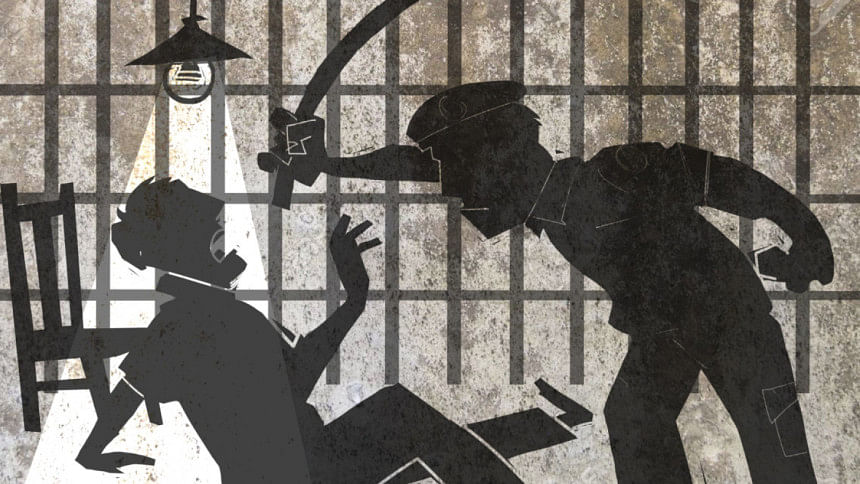Remand redecorated: Same torture, new curtains?

So here we are, ladies and gentlemen, comrades and comrades-in-arms, at the next episode of "Decorative Justice." After years of creative choreography between the state and your basic human rights, the government has finally decided to introduce a groundbreaking, revolutionary, earth-shattering change: you now have the right not to be tortured during arrest. Yes, the bar is that low, and yes, we are still applauding.
According to the law adviser himself, the interim government is preparing to amend the Code of Criminal Procedure (CrPC) 1898—you know, that charming Victorian relic that still decides whether a man gets bail or a beating. The goal? A "rights-based approach" during arrests and interrogations. Apparently, someone in the interim government opened the constitution, possibly even read it, and remembered that torture is bad. Bless them. But let us not be cynical—yet. Let's first admire the PR.
In a Commonwealth-themed youth workshop (because nothing screams "youth empowerment" like legal jargon), Law Adviser Asif Nazrul proudly announced the proposed amendment. Arrests and interrogations will now come with "strict safeguarding measures." Presumably, this means you'll be beaten with consent, or at the very least, someone will read you your rights while they plug in the electric wires.
To understand the significance of this "reform," we must travel back to BLAST v Bangladesh (2003), where the High Court essentially stated, "please stop chaining people like medieval prisoners." Then to the 2016 BLAST v Bangladesh case—truly a sequel worth watching—where the HC gave the police a list of dos and don'ts for arresting people under Section 54 of the CrPC and sending them to remand under Section 167. These weren't revolutionary demands: just small things, like not torturing people for confessions, informing families when someone is picked up, and recording reasons for arrest. Basically, the legal version of "don't kidnap and slap people for fun."
But like every blockbuster HC judgment in Bangladesh, this one too was screened only for a limited audience—the judiciary. The police, prosecution, and parliament never seemed to buy a ticket. For years, Section 54 remained the legal equivalent of "vibe check failed." You could be arrested for suspicion of intent to commit a crime, which is just fancy talk for "you looked too political."
And now, amid a post-uprising transitional government that is balancing on a tightrope, this amendment is being dangled before us like a golden carrot. But here's the thing—after decades of being fed with sticks, we're suspicious of carrots. And when a reform is announced by a government that is struggling to keep it all together, one must ask: is this actual reform or just reputational window dressing?
Because let's be clear: no law in Bangladesh is safe from abuse when power is unaccountable. Our track record speaks for itself. You can criminalise torture under The Torture and Custodial Death (Prevention) Act 2013, but then you can just make sure no one ever gets convicted under it. You can sign international treaties like UNCAT, promising not to torture anyone, and then just do it anyway. After all, as we learned during the last regime, treaties are like wedding vows—they sound good under fairy lights but mean very little when the lights go off.
What we need, and have always needed, is not more laws but more enforcement. The Supreme Court in 2016 gave us gold-standard guidelines. It said: record the arrest, notify family, ensure medical exams before and after remand, and let the arrestee speak to a lawyer. These aren't utopian demands—they're literally constitutional rights under Articles 31, 32, and 35 of the Bangladesh Constitution and Articles 7 and 9 of the International Covenant on Civil and Political Rights (ICCPR). So why are we treating them like radical Gen Z demands from TikTok?
Even India—where the police are no strangers to baton choreography—had their moment of reckoning in DK Basu v State of West Bengal (1997). The Indian Supreme Court issued a checklist of rights during arrest, one of which was that the police must wear visible name tags. Here in Bangladesh, half the time, you're lucky if the police wear uniforms at all. Arresting officers often arrive like paranormal entities—no badge, no warrant, just vibes and violence.
And yet, this amendment could be historic. If—and this is the size of a Supreme Court courtroom—it is implemented. Because if it's just another box ticked for the Commonwealth Charter conference brochure, then let's be honest: it's not reform. It's interior design.
Reform means making Section 54 compliant with constitutional guarantees. Reform means making confessions in remand inadmissible in court. Reform means prosecutors who prosecute independently, not prosecute on WhatsApp instructions from party offices. Reform means retraining the police in a rights-based investigation, not teaching them how to hit without leaving a mark.
Reform also means justice for past violations. If you don't address the countless custodial deaths and the disappeared who never returned, then your amendment is nothing but a band-aid on a bullet wound. A glossy promise wrapped around a very bloody history.
So yes, dear citizens, soon you may be arrested in a slightly more polite manner. Perhaps someone will offer you water after your third slap. Maybe your mother will get a phone call before your mugshot ends up in the paper. We've entered the era of deluxe detention—same trauma, better packaging.
As for the rest of us, let's continue dreaming. Not just of better arrests, but of a country where your rights aren't subject to seasonal reforms and donor optics. Where justice isn't decorative. Where dignity is the default.
Until then, remember to carry a lawyer's number, a power bank, and a healthy distrust of "reform announcements." You never know when Section 54 might take a personal interest in you.
Barrister Noshin Nawal is an activist, feminist, and a columnist for The Daily Star. She can be reached at [email protected].
Views expressed in this article are the author's own.
Follow The Daily Star Opinion on Facebook for the latest opinions, commentaries and analyses by experts and professionals. To contribute your article or letter to The Daily Star Opinion, see our guidelines for submission.

 For all latest news, follow The Daily Star's Google News channel.
For all latest news, follow The Daily Star's Google News channel. 










Comments